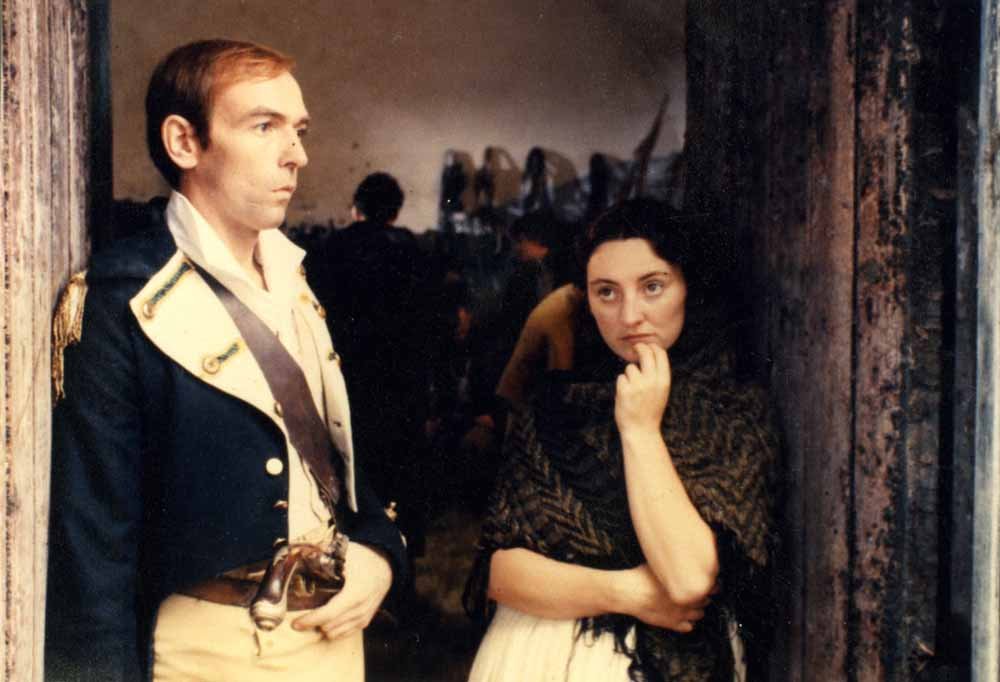Curated in collaboration with Ruaíri McCann
Ár Lorg Saoirse: A Radical Irish Cinema takes place in the cinema from Thursday 3/17 – Sunday 3/20, each film for a suggested donation of $15
On St. Patrick’s Day around the world, the Irish identity blooms into broad, fixed symbols, subbing in for a wide range of experiences across made a thorny past and present day.
My own account is as good an example as any. I was born in Belfast to working class, catholic parents, but raised south of the border in the ‘wild west’. The much-mythicised font of ancient Celtic culture, in actuality, is a cosmopolis, where I was one blow-in among many. These circumstances – coupled with an awareness of my family’s experience living through the conflict in the North known as ‘The Troubles’ – nourished utopian desires of Ireland as a byword for socialist and anti-colonial struggle. I’m far from alone, within my generation and others, in striving for a new, radical Irish culture. One that could be both specific and highly inclusive, free from traditional shackles like the Catholic Church and the new gods and masters, the corporate American imperium and the neoliberal Irish state.
You will find little of this revolutionary thinking nor its long lineage in armed and civil struggle reflected in mainstream Irish cinema, which sells the tourist board version; circumscribed, simplified and toothless.
Our aim with Ár Lorg Saoirse: A Radical Irish Cinema is to present a bounty of alternative images of Ireland, crafted with the interweaving of narrative and documentary.
Ireland’s dissident ‘First Wave’ is represented in Maeve (1981), a feminist memory piece made on the streets of a wartorn, segregated Belfast, and On a Paving Stone Mounted (1978), a crazy quilting of fiction and non-fiction depicting the Irish immigrant experience in England. A Sense of Loss (1972) is an outsider’s investigation into The Troubles, a moral position located between a rock and hard place. While The Black and the Green (1983), is a film of solidarity and debate between two civil rights movements: one Catholic and Northern Irish, the other Black and American.
Together, these films test Ireland’s most hotly contested zones, evoking the radical politics and hidden truths of the Irish experience.
Lá Fhéile Pádraig sona duit.
– Ruairí McCann
Thanks: Thomas Beard, Judith Bourne, Dean Kavanagh, Eleanor Melinn, Pat Murphy, Jake Perlin, Bob Quinn, Elena Rossi-Snook
Maeve and Anne Devlin are presented with the support of IFI International and Culture Ireland.
#IntheCinema:
Bernadette + The Black and the Green
Duncan Campbell, 2008, 37 min.
St. Clair Bourne, 1983, 45 min.
Thursday 3/17 at 7:30PM #IntheCinema
Visibility: Moderate + Caoineadh Airt Ui Laoir (Lament for Arthur Leary)
Vivienne Dick, 1981, 38 min.
Bob Quinn, 1983, 52 min.
Friday 3/18 at 7:30PM #IntheCinema
On a Paving Stone Mounted
Thaddeus O’Sullivan, 1978, 93 min.
Saturday 3/19 at 2PM #IntheCinema
Maeve
Pat Murphy & John Davies, 1978, 115 min.
Saturday 3/19 at 4:15PM #IntheCinema
Anne Devlin
Pat Murphy, 1984, 121 min.
Saturday 3/19 at 7PM #IntheCinema
A Sense of Loss
Marcel Ophuls, 1972, 135 min.
Sunday 3/20 at 5PM #IntheCinema











